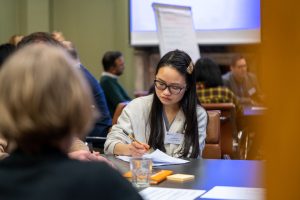 FinTech is integral to so much of business and society today, whether it is impacting financial services or the gig economy. PhD candidate Lan Nguyen attended the FinTech for the Good of Society Workshop last week and wrote about the discussions that took place.
FinTech is integral to so much of business and society today, whether it is impacting financial services or the gig economy. PhD candidate Lan Nguyen attended the FinTech for the Good of Society Workshop last week and wrote about the discussions that took place.
On 11 January, the University of Bristol held an in-person FinTech for the Good of Society Knowledge Exchange Workshop in collaboration with FinTech West. This half-day workshop brought together experienced academic and social scientists with FinTech companies, stakeholders, and end-users of such technologies. The key aim of this workshop was to facilitate knowledge exchange between researchers, FinTech companies, and stakeholders to identify future opportunities for coproduction and collaboration on the challenges of FinTech for the good of society.
Building partnerships
The workshop was kicked off by Ms. Jane Leeks’ introductory remarks and then the microphone was handed over to Professor Jon Beaverstock, who gave an insightful keynote speech. Professor Beaverstock highlighted the importance of collaboration and sharing knowledge within the FinTech community and the roles that the University and researchers played in shaping a better place. Following this topic, Mr. Stuart Harrison introduced Whitecap Consulting, a brand-new analysis of the Southwest FinTech ecosystem, and discussed how the University of Bristol’s social sciences and city-region FinTech communities could learn from each other and begin to build partnerships and work collaboratively together for the good of society
Engagement between industry and academia
In the next section, seven panellists including Matt Bonetti (from Hargreaves Lansdown), Professor Sharon Collard (from University of Bristol), Professor Jon Beaverstock (from University of Bristol), Bea Gelder (from LOQBOX), Chevano Baker (PhD student), Dave Henderson (From Penny) and Edward Tellwright (from British Business Bank), joined a roundtable chaired by Mr. Harrison. The discussions were around the key aim of this event – to encourage engagement between industry and academia, real projects, and actions.
Collaboration and sharing knowledge
After a coffee break, there was a group activity in which participants were divided into four groups including (1) Collaboration & Engagement (led by Stuart Harrison and Jon Beaverstock), (2) Talent Acquisition (led by Bea Golder and Matt Bonetti), (3) Inclusion (led by David Henderson and Sharon Collard) and (4) Impacts of Innovation on Society (led by Chevano Baker). After every fifteen minutes, participants in one group were allowed to move to the other group to make sure that everyone engaged in all four topics. Flipcharts and post-it notes were effectively used by the panellists to stimulate key questions around the theme for their group and capture feedback from participants.
Find out more about research at the University of Bristol Business School

